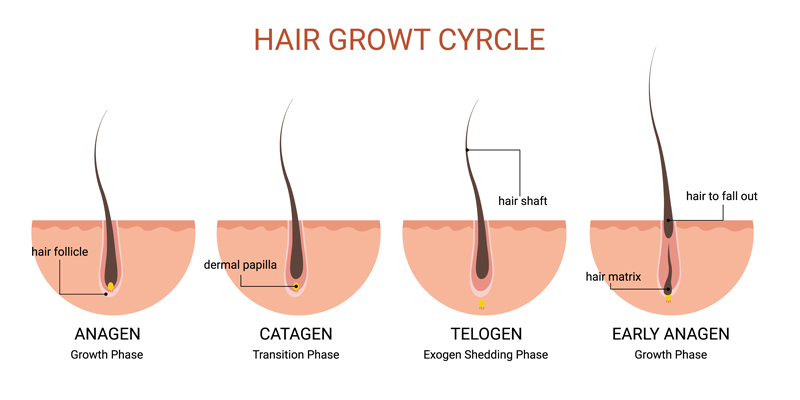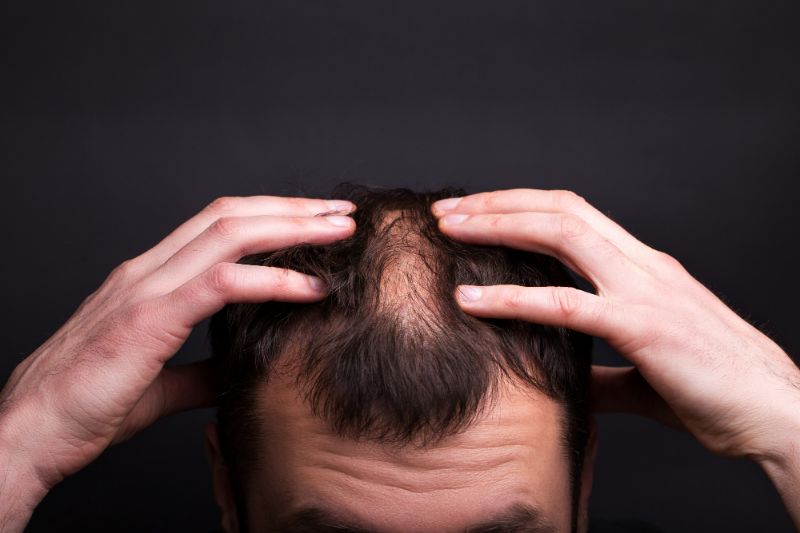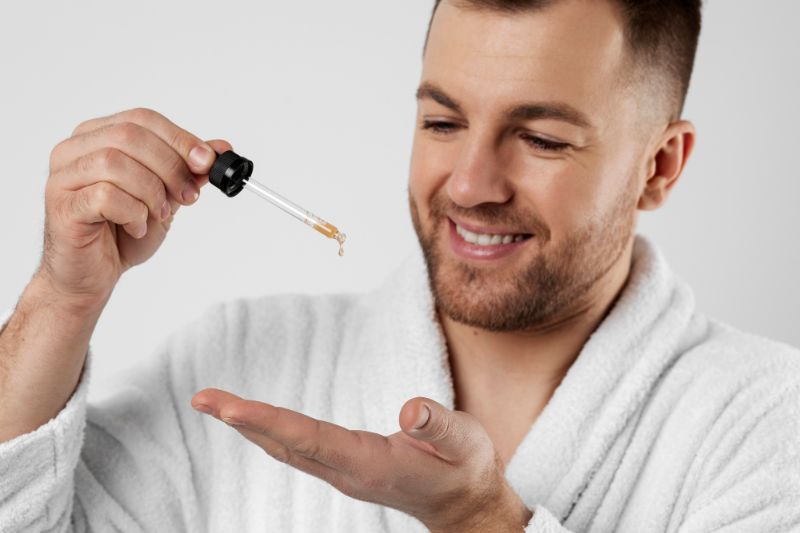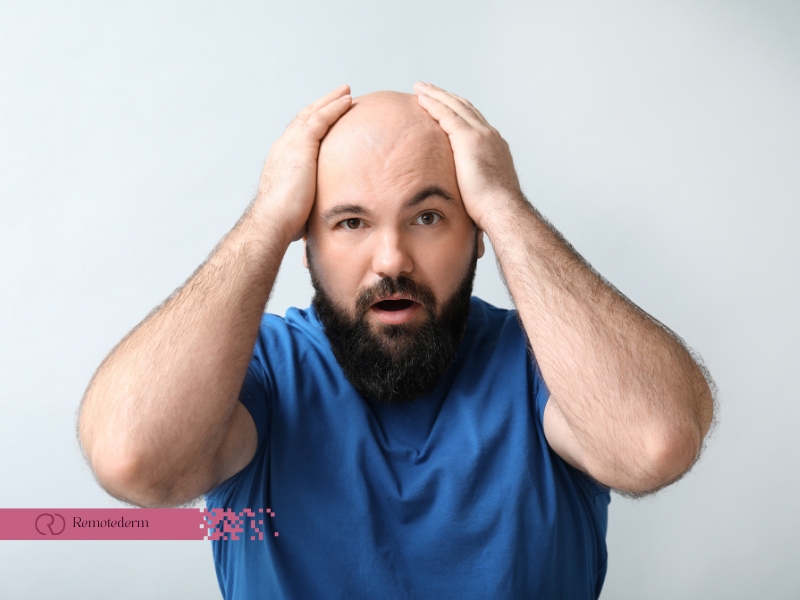When it comes to hair loss, men of all ages share a common concern, and one particular hair loss condition that predominantly affects them is Telogen Effluvium in men (TE). Characterized by excessive hair shedding due to disruptions in the natural hair growth cycle, TE stands apart from male pattern baldness. In this comprehensive guide, we delve into the intricacies of Telogen Effluvium in men, exploring its symptoms, diagnosis, and treatment options. Whether you’re dealing with hair loss or seeking to expand your knowledge on the topic, read on to gain vital insights that can empower you to address this condition effectively.
What is Telogen Effluvium in Men?
Hair loss is a common concern for men of all ages, and one type that affects them is called Telogen Effluvium (TE). TE causes excessive hair shedding due to disruptions in the hair growth cycle. While it’s not typically linked to male pattern baldness, understanding male Telogen Effluvium, its symptoms, diagnosis, and treatments is important for managing it effectively.
Telogen Effluvium is a reversible hair loss type that affects both men and women. In men, it’s called “male Telogen Effluvium.” To understand this condition, it’s crucial to know how hair grows and cycles through three phases in the natural hair growth cycle:
- Anagen (growth phase)
- Catagen (transitional phase)
- Telogen (resting phase)

Telogen Effluvium occurs when there is an abrupt shift of hair follicles from the growth phase to the resting phase. Let’s explore this phenomenon in more detail to better understand its impact on male individuals and the factors that contribute to it.
Symptoms of Male Telogen Effluvium
Male Telogen Effluvium (TE) is characterized by a range of distinctive symptoms that can be concerning for those experiencing it. Understanding these symptoms is essential in recognizing and addressing this condition effectively. Here are the key symptoms of male TE:
- Increased Hair Shedding
One of the most prominent and distressing symptoms of male TE is a significant increase in hair shedding. This symptom often becomes noticeable during daily activities such as washing, brushing, or even lightly running your fingers through your hair. Individuals with TE may observe more hair falling out than usual, which can be alarming.
- Thinning Hair
Over time, the persistent increase in hair shedding can result in visible thinning of the hair. This thinning is particularly evident in specific areas of the scalp, such as the crown and the top of the head. As more hair follicles enter the resting phase and fewer are in the growth phase, the overall thickness and volume of the hair can decrease.
- Reduced Hair Density
Male Telogen Effluvium often leads to a noticeable decrease in hair density. This means that your hair may appear less full and lush, and there may be an increased visibility of the scalp, especially in areas where the thinning is most pronounced. Reduced hair density can impact an individual’s overall appearance and self-esteem.

- Slower Hair Growth
Alongside increased shedding and thinning, individuals with male TE may observe that their hair is growing more slowly than usual. The hair growth rate can decelerate, resulting in shorter and finer hair. This change in hair texture and growth speed can further contribute to the perception of hair loss.
- Scalp Sensitivity
Some people with TE may experience scalp sensitivity, which can manifest as itchiness or discomfort. This sensitivity can be attributed to the disruption of the hair growth cycle and the increased shedding of hair. It’s important to note that scalp sensitivity may vary among individuals and can be a source of discomfort.
Diagnosing Telogen Effluvium in Men
If you suspect you have Telogen Effluvium male, it is essential to consult a healthcare professional or dermatologist for a proper diagnosis. The diagnosis typically involves:
- Medical History: Because TE can be triggered by recent illnesses, surgeries, or significant life events, your doctor will inquire about your medical history.
- Physical Examination: The doctor will examine your scalp and hair to determine the extent of your hair loss and to look for signs of other scalp conditions.
- Pull Test: The doctor may perform a simple pull test in which he or she gently tugs on your hair to see how easily it comes out. TE is characterized by increased hair shedding.
- Blood Tests: Blood tests may be performed in some cases to check for underlying medical conditions, such as thyroid disorders or nutrient deficiencies, that may contribute to TE.
Once diagnosed, your healthcare provider will work with you to determine the underlying cause of your Telogen Effluvium, as addressing the root cause is crucial for effective treatment.
Treatment Options for Male Telogen Effluvium
- Addressing Underlying Causes: If TE is caused by a medical condition, such as iron deficiency or thyroid issues, treating the underlying cause can often help reverse hair loss.
- Nutrition and Supplements: Ensuring you have a well-balanced diet rich in essential nutrients like biotin, zinc, and iron can support hair health. Supplements may be recommended if deficiencies are detected.
- Stress Management: Reducing stress through techniques like meditation, yoga, or counselling can be beneficial as emotional stress is a common trigger for TE.
- Avoiding Harsh Hair Care Practices: Minimize the use of hair styling products, heat styling tools, and tight hairstyles that can put additional stress on your hair.
- Minoxidil for Male Telogen Effluvium: In some cases, your doctor may recommend the use of topical minoxidil, an over-the-counter or prescription medication. Minoxidil can help stimulate hair growth and is FDA-approved for male pattern baldness, but it can also be effective in Telogen Effluvium cases.

Minoxidil is a topical medication available in various forms, such as foam or liquid, and is applied directly to the scalp. It is thought to promote hair growth by increasing blood flow to hair follicles and extending the duration of the hair cycle’s anagen (growth) phase. When using minoxidil for male TE, consider the following:
- Consult a Professional: Before using minoxidil, consult a healthcare provider or dermatologist to ensure it’s the right choice for your specific condition.
- Consistency is Key: Minoxidil must be applied consistently as directed. Results may not be visible for several months.
- Possible Side Effects: Some individuals may experience side effects like scalp irritation or increased shedding initially. These often subside with continued use.
- Long-Term Use: Minoxidil is typically used long-term to maintain results. Discontinuing its use may lead to a return of hair loss.
Lifestyle and Dietary Factors
While medical treatments like minoxidil can be effective, there are also several lifestyle and dietary factors to consider when battling Telogen Effluvium male:
- Healthy Diet: Consume a diet rich in essential vitamins and minerals, including biotin, iron, and zinc. These nutrients are crucial for hair health.
- Hydration: Staying well-hydrated supports overall bodily functions, including hair growth.
- Gentle Hair Care: Avoid harsh hair care practices like excessive heat styling, tight hairstyles, and harsh chemicals. Opt for gentle shampoos and conditioners.
- Regular Exercise: Physical activity increases blood circulation, which is beneficial to hair follicles.
- Stress Reduction: Find effective stress management techniques such as meditation, yoga, or hobbies that help you relax.
Final Thoughts
Male Telogen Effluvium is a reversible hair loss condition that requires prompt attention. If you notice increased hair shedding, thinning hair, reduced hair density, slower growth, or scalp sensitivity, consult a healthcare provider or dermatologist for diagnosis and personalized treatment.
Treatment options may include addressing underlying causes, maintaining a balanced diet, managing stress, and adopting gentle hair care practices. Minoxidil can also be a helpful tool, but it requires consistency and patience.
Remember, male Telogen Effluvium is manageable, and with the right approach, you can maintain healthy, fuller hair and boost your confidence.
FAQs
- How do I know if I have Telogen Effluvium?
Increased hair shedding, thinning, and slower hair growth are common symptoms; consult a doctor for a definitive diagnosis.
- What is the distinction between male pattern baldness and Telogen Effluvium?
Male pattern baldness follows a distinct pattern, while Telogen Effluvium leads to widespread hair shedding without a specific pattern.
- Is male Telogen Effluvium hereditary?
Unlike male pattern baldness, TE is typically not hereditary; it results from external factors and is not passed down through family genes.
- Is Telogen Effluvium in men a lifelong condition?
Typically, no; it’s usually temporary, and hair growth can resume once the triggers are addressed. However, it’s essential to manage potential triggers to prevent recurrence.
